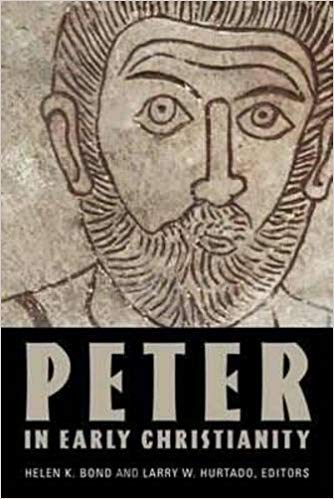Paul Parvis broaches a subject which one first blush seems to have no basis in history, namely when was Peter the bishop of Antioch, and secondly, when did he found the church there? The short answer would be he wasn’t and he didn’t, however some of the church fathers seem to think otherwise. The evidence is found, partially in Jerome’s translation of Origen’s sixth Homily on Luke, which seems to say that Ignatius of Antioch was the second bishop in that city after Peter. As Parvis points out here there is also the Nicetas fragment which appears to tell a different tale, namely ‘after Peter the second bishop was Ignatius’ which in the Greek indicates there was a first bishop after Peter who is unnamed (p.264). Curiouser and curiouser. Then there is Eusebius’ Chronicon which in Jerome’s translation says that Peter founded the church in Antioch but then is sent to Rome (in year two of the reign of Claudius— i.e. A.D.43) where he continued for 25 years as bishop, preaching the Gospel (p. 265 in Parvis). This puts Peter death at A.D. 68, not 64. ‘Bishop’ is Eusebius’ word choice, but it appears the earlier Greek text simply said ‘presided over’. Furthermore, in the Armenian list of bishops in Antioch, Euodius not Peter is listed as the first bishop of that city.
More important Eusebius (H.E. 3.1.2) says this “Peter seems to have preached to Jews of the Diaspora in Pontus, and Galatia, and Bithynia and Cappadocia, and Asia. And in the end when he was in Rome he was crucified upside down, which is the way he himself asked to suffer.” The important bit of this for our purposes is the first sentence, which indicates clearly that Eusebius takes 1 Peter. 1.1-2 to indicate that Peter was writing to Jews in those regions, not Gentiles. This makes good historical sense in light of the division of labor between Peter and Paul mentioned in Galatians. Eusebius claims he is quoting the above verbatim from Origen’s third book of commentaries on Genesis, but alas, we can not cross check him on that. Eusebius does mention in passing that Ignatius succeeded Peter in Antioch (3.36.3), but as Parvis rightly notes, Eusebius’ ecclesiology was that apostles appointed bishops, they themselves were not bishops (p. 267). In a homily by John Chrysostom on the martyrdom of Ignatius, written while he was in Antioch, Ignatius is praised as the one who succeeded to the rule in Antioch after Peter spent much time there. Rufinus’ version of the pseudo-Clementine Recognitions has Peter having a sort of chaired professorship in Antioch and teaching there, but he is not said to be a bishop (Rec. 10.71-72).
In an attempt to ‘exonerate’ Peter there was an argument between Clement of Alexandria and Jerome, with Jerome refuting Clement’s claim that the Cephas Paul was rebuking in Antioch was not our Peter, but someone else of the name! The argument includes an argument from silence. Clement saying Acts doesn’t mention a confrontation between Paul and Peter in Antioch, to which Jerome retorts, ‘nor does it mention Peter was bishop in Antioch’ but absence of evidence is not evidence of absence!! Even later Gregory the Great was claiming Peter was bishop in Antioch for 7 years, whereas Nicophorus says 11 years.
One of the most insightful comments of Parvis is the following about which I think he is undoubtedly correct: “In later antiquity we are moving toward a more jurisdictional and juridical model [of bishop]. It is a transition perhaps not completed until the time of Leo, but one already in train. While for someone like Irenaeus [in the third century] the bishops teach what the apostles taught, in later centuries it was becoming increasingly true that the bishops are what the apostles were.” (p. 271). Parvis rightly lays at the door of Jerome the time when the legend crystalized that Peter was the bishop of Antioch.
As a concluding interesting note, on January 6, 341 A.D. Constantius dedicated the brand new church of Holy Concord in Antioch. As Parvis says, if we only had the record of what was said in that dedication we might discover if the ruler himself thought Peter was the first bishop in Antioch. I would simply add two historical points: 1) in the NT the term episkopos means overseer, and is perhaps on the way to being an office in Phil. 1.1ff. 2) Peter certainly spent some time in the 40s in Antioch as Galatians 2 attests. He was there long enough to get to know various Jewish and Gentile converts there and to share table fellowship with them. When Paul returns from his first missionary journey he finds Peter there. Nothing in Galatians or Acts suggests that Peter was the founder of the church in Antioch, nor that he was leading the church in Antioch, though he might have been teaching there for a while.













